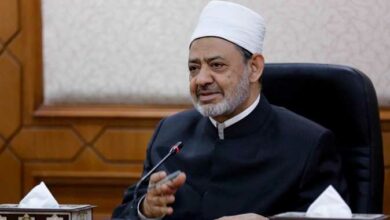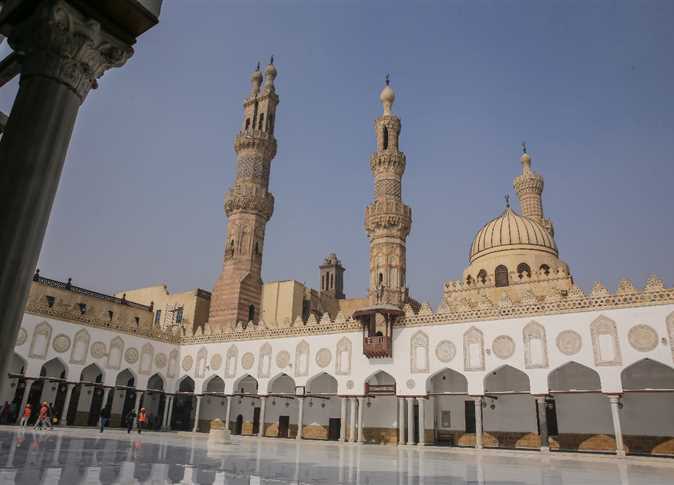Islamist and secular groups on Wednesday endorsed a document issued by Al-Azhar earlier this summer affirming that Egypt’s new political system should be democratic. But they disagreed over whether to make the document binding on the architects of the first post-Mubarak constitution.
The representatives of at least ten political parties convened in Al-Azhar to discuss the details of Al-Azhar Declaration where the world’s oldest Sunni institution laid out its position on Egypt’s prospective political system. After deliberations with intellectuals and religious scholars, Al-Azhar declared in June that Egypt should be a democratic nation-state based on a constitutional order that ensures full separation between the different branches of government and guarantees full equality for all citizens. The declaration calls for respecting freedom of thought and opinion and voices support for human rights, including children’s and women’s rights.
“The document is very refined and civilized,” potential presidential candidate and leader of the liberal New Ghad party Ayman Nour told reporters after the meeting. “It asserts the cohesiveness of the Egyptian people once again and unites political forces over the values and principles of a modern democratic and constitutional state.”
In the meantime, the declaration specifies the identity of the state in an elaborate clause, which reads that Egypt is a Muslim state, Arabic is its official language and Islamic Sharia law is the primary source of legislation.
“We are happy with today’s agreement. Nobody disagreed over the content or the meanings of the document,” Mohamed Morsi, president of the Muslim Brotherhood’s Freedom and Justice Party told reporters after the talks that lasted for almost two hours.
In a statement given out to reporters, the Grand Sheikh of Al-Azhar Ahmed Al-Tayeb insisted that the declaration should remain as a “guiding” rather than a binding document, dashing the hopes of many secular groups who wished the declaration could be used as a binding frame of reference when the new constitution is hammered.
“Today we had one remark,” Mohamed Hamed, leader of the liberal Free Egyptians party told reporters. “If everybody supports it [the document], why wouldn’t it change from being guiding to being binding?”
“This document cannot heel divisions between political forces unless it becomes binding to all parties and to the constituent assembly that will draft the constitution,” added Hamed.
The new parliament is expected to be elected in November. This same parliament will be required to elect a 100-member constituent assembly to write the new constitution. Most secular forces have voiced fears that Islamists, who seem best organized and most capable of mobilizing voters, might garner a sweeping majority in the new parliament and hence monopolize the drafting of the constitution. Such control might enable them to design a religious state where individual liberties would be violated and religious minorities and women discriminated against. To pre-empt such a scenario, seculars have been pushing for the issuance of a binding document with a set of “governing principles” or “supra-constitutional principles” that should be included in the new constitution. The document would state unequivocally that Egypt is a democratic and civil state where all citizens hold equal rights regardless of their race, religion or gender.
“[Today’s] meeting is meaningless and valueless since the principles [that came in the declaration] are just guidelines,” said Emad Gad, a leader of the Egyptian Social Democratic Party.
“If Al-Azhar had said that from the beginning, civil forces should not have participated. Al-Azhar had submitted to pressure from the Muslim Brotherhood and Salafi forces,” added Gad, whose party was represented in the meeting.
Besides Gad’s and Hamed’s parties, other non-Islamist groups were represented, including the Wafd Party, the Democratic Front Party and the National Association for Change. Also several presidential hopefuls engaged in the talks, including Mohamed ElBaradei, Amr Moussa, Mohamed Selim al-Awa, Abdullah al-Asha’al and Nour.
In the meantime, different Islamist factions attended, including the Muslim Brotherhood, Jama’a al-Islamiya, the Alexandria based Reform and Renaissance Party, and the Salafi Da’wa. They approved the document but also celebrated Tayeb’s statement about the non-binding nature of the document.
“By announcing that the document is just guiding, the grand sheikh of Al-Azhar put an end to the debate and declared the death of the idea of issuing a set of supra-constitutional principles,” Jama’a al-Islamiya leader Essam Derbala told journalists.
Despite Tayeb’s statement, the generals may consider imposing a set of principles on the constitution’s authors. Earlier this month, Ali al-Selmy, deputy prime minister for political affairs, announced that the Supreme Council of the Armed Forces would issue a constitutional declaration guaranteeing that Egypt would be a democratic and civil state. This announcement was seen as an attempt to diffuse secularists' fear of Islamists. If this decree is handed down, the constituent assembly will be required to adhere by its content while writing the constitution. Islamists have vowed to take to the streets if that happens.




